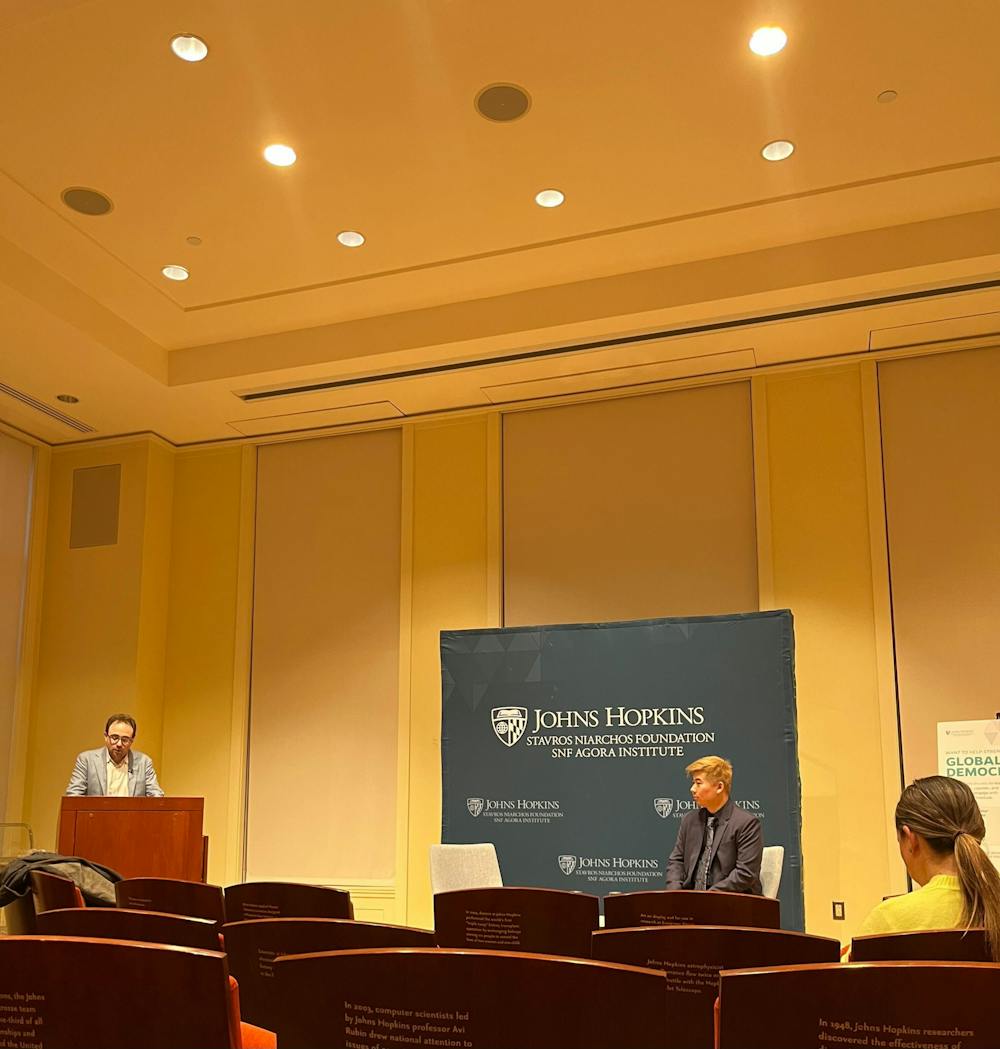The Stavros Niarchos Foundation (SNF) Agora Institute hosted scholar Yascha Mounk to discuss his new book, The Great Experiment: Why Diverse Democracies Fall Apart and How They Can Endure, on April 26. His talk was followed by an audience Q&A session, moderated by sophomore SNF Student Engagement Board Member Frank Meng.
Mounk is a political scientist and a senior fellow at the Agora Institute whose work focuses on the rise of populism and other challenges facing liberal democracies. He also serves as a contributing editor to The Atlantic and is a senior fellow on the Council on Foreign Relations.
He discussed the ease with which human sort themselves into groups and employ discriminatory out-group mechanisms, especially along the lines of race, ethnicity and religion. He noted that democratic institutions can exacerbate these conflicts because they respond to the will of demographic majorities.
In order to overcome these challenges, he emphasized the importance of liberal principles.
“Liberals are deeply aware of the dignity of groups, but believe it’s the voluntary aspect that makes them worth celebrating,” he said. “In this conception, the individual is the basis of the state and citizens can choose to give importance to groups. That helps contain the stakes of politics by respecting people’s groupishness but also their right to change groups.”
Though Mounk recognized the importance of using metaphors to describe society, in his eyes, the existing melting pot and mosaic metaphors are misguided — the former for devaluing groups too much and the latter for emphasizing lines between these groups.
In place of these metaphors, he suggested that democratic states should be viewed as public parks.
“In a public park, we can hangout and say, ‘we just want to chat amongst ourselves; we’re not going to talk to anyone else,’ but we might also come into contact with other people and make new friendships,” he said. “Nobody forces you to enter those kinds of contexts but, as a result of interactions, some commonality develops. That should be the aspiration of our society.”
In an email to The News-Letter, PhD student Alli Abolarin considered this metaphor.
“Professor Mounk’s comment on the failures or shortcomings of the melting pot metaphor for American society was interesting,” he wrote. “I do agree that his proposed public park analogy is probably a better way to frame group dynamics in a society that aspires towards full participation of all groups in its democratic processes.”
Similar to Abolarin, Meng evaluated this metaphor in an email to The News-Letter.
“This optimistic vision proposes a new way of thinking that creates a form of cultural patriotism that unites us,” he wrote. “Nevertheless, considering the deeply entrenched white supremacy rooted in American history and that even six decades after Brown vs. Board, we still have not restored its promise, it is hard to imagine ‘a sense of common purpose’.”
Mounk added that for this type of democratic space to be successful, there must be a set of ground rules that are clearly enforced. These rules would serve as checks on those who believe the park should cease to exist.
He highlighted that a cautious form of patriotism is the second element essential to maintaining a democracy, since it creates an identity that can take citizenry beyond their cultural and ethnic groups.
He explained the importance of two-pronged patriotism.
“When decent, tolerant people leave the symbolism of patriotism to far-right populists and others, it makes it much easier for those people to appropriate the symbols of a nation for their own political purposes,” he said. “In certain circumstances, patriotism can motivate people to stand up for their collectivity and have solidarity with people who are different.”
He advocated for what he calls cultural patriotism, which combines the important elements of civic patriotism with a shared pride for the dynamic customs, peoples and places of a country. He added that these additional cultural factors are necessary because most citizens do not center politics in their lives.
In an email to The News-Letter, PhD student Jahnavi Pejavar praised Mounk’s optimistic outlook, discussing how easy it can be to look at political issues with a sense of hopelessness.
“It is particularly important because points of views such as his need to be framed in a way to motivate people to work towards something better, rather than giving up because nothing seems to work,” she wrote.
Meng shared his hopes for the future of book talks and other speaker events at the University.
“We need more events like this creating an arena to build a critical conversation between the author and the audience,” he wrote. “By asking challenging questions, the author can clarify his argument, and we, as a moderator or as an audience, can reflect on our thinking and spark new ideas.”





